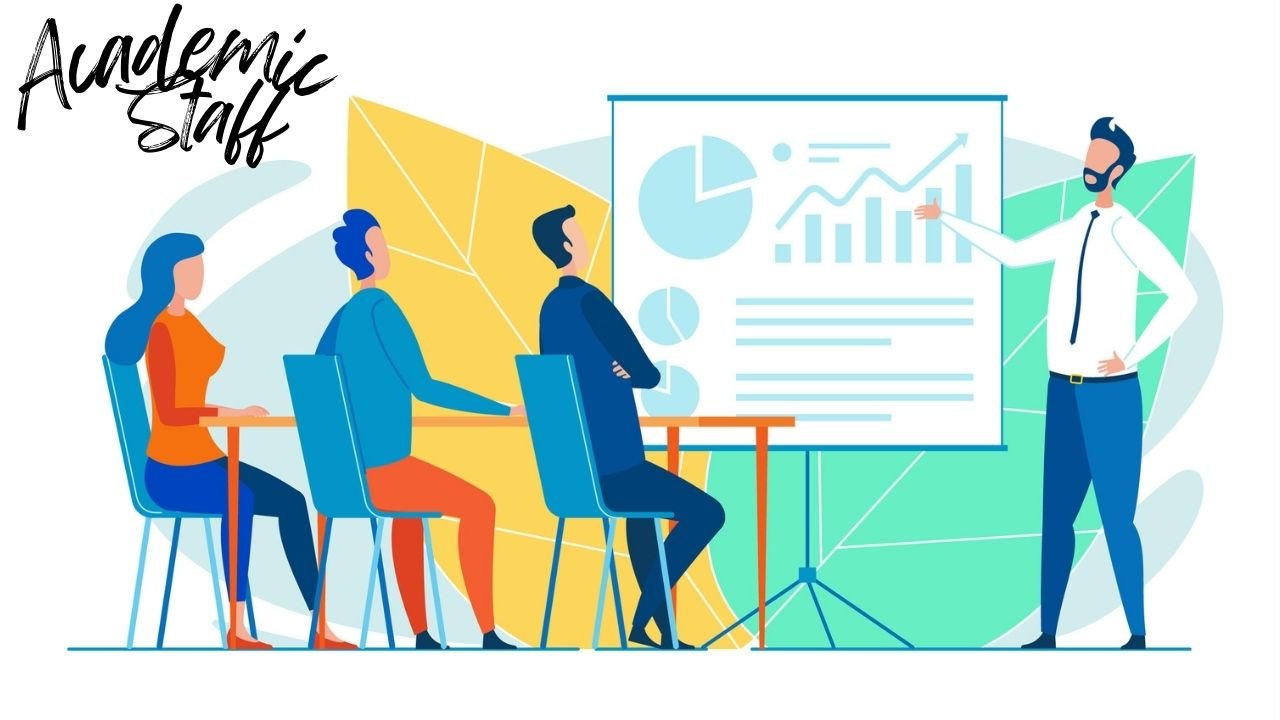The term academic staff In the energetic domain of the scholarly world, alludes to the committed experts who play multifaceted parts in the instructive environment of teaching around the world. Composing an assorted cluster of people, scholastic staff individuals are the driving drive behind the creation, dispersal, and application of information inside the scholastic community.
Academic staff community is where data prospers and improvement knows no bounds. At the heart of their institution lie the committed individuals who constitute their educational staff. They are not as if they were instructors but torchbearers of insights, coordinating and persuading the other period of researchers, trailblazers, and pioneers.
Academic Staff: A Closer Look at Their roles and Responsibilities
Here are some of the important roles and responsibilities of academic staff community:
- Teaching: Scholastic staff individuals serve as teachers, giving information and cultivating basic considering abilities among understudies. Whether conveying addresses, driving classes, or encouraging hands-on learning encounters, they endeavor to make locks in and enhancing learning environments.
- Research: A foundation of the scholarly community, inquire about, fills advancement and progresses information over different disciplines. Scholarly staff individuals effectively lock in to investigate exercises, conduct tests, distribute insightful articles, and contribute to the collective understanding of their individual fields.
- Mentorship: Past the classroom and research facility, scholarly staff individuals serve as coaches and advisors to understudies, directing them on their scholarly and career ventures. Through personalized back and useful input, they support the abilities and yearnings of future researchers and professionals.
- Administration: Scholastic staff individuals regularly take on regulatory parts, such as office chairs, program facilitators, and committee individuals. In these capacities, they contribute to the key arranging, administration, and administration of scholastic programs and activities.
Decoding the Different Academic Staff Categories : What You Need to Know
Here are the different types of academic staff members;
- Faculty: Tenured, tenure-track, or aide staff individuals contain the center of scholarly staff, dependable for educating, investigating, and benefit exercises inside their particular divisions or disciplines.
- Researchers: Inquire about staff individuals, counting postdoctoral analysts, investigate partners, and inquire about collaborators, center basically on conducting inquire about ventures, frequently collaborating with workforce individuals and graduate students.
- Administrative Staff: Scholarly education depends on regulatory staff individuals to back different authoritative capacities, counting affirmations, enlistment, understudy administrations, and organization research.
- Librarians: Curators play a pivotal part in supporting educating, learning, and inquire about by giving access to academic assets, helping with data proficiency, and overseeing library collections.
Academic Staff Characteristics on Student Achievement : A Comprehensive Overview

Here are the details regarding academic staff characteristics:
- Skill and Qualifications:These individuals are eminent for their profundity of information and capabilities inside their individual areas. With progressed degrees, certifications, and proficient honors, they bring a richness of skill to their instructing, investigating, and benefit endeavors.
- Pedagogical Proficiency: At the heart of their mission lies a commitment to educational fabulousness. Scholarly staff individuals have a nuanced understanding of educating techniques, learning hypotheses, and direction’s best homes.
- ResearchAcumen: Fueling the motor of revelation, scholarly staff individuals are enthusiastic defenders of academic request and inquire about advancement. They effectively contribute to the headway of information through groundbreaking investigative ventures, distributions, and collaborations inside their areas.
- Mentorship and Guidance: Beyond their parts as teachers and analysts, scholarly staff individuals serve as guides and guides, supporting the mental and proficient development of understudies.
- Institutional Citizenship: They are indispensably individuals of the regulation texture, effectively contributing to the administration, authority, and vital course of their particular teaching. Whether serving on committees, errand powers, or counseling sheets, they play an imperative part in forming organization approaches, activities, and needs.
Frequently Asked Questions:
1.Who are scholastic staff members?
Academic staff individuals, frequently alluded to as staff or teachers, are experts utilized by instructive teaching to educate, conduct inquire about, and contribute to the scholarly community. They may hold different titles, counting teachers, teachers, analysts, and administrators.
2.What are the essential parts of scholastic staff?
The essential parts of scholastic staff incorporate instructing, conducting inquire about, giving mentorship and direction to understudies, contributing to organization administration and organization, and locks in in community benefit and outreach activities.
3.What capabilities do scholarly staff individuals regularly possess?
These individuals ordinarily have progressed degrees in their individual areas, such as a Ph.D., M.D., J.D., or identical terminal degree. They may too hold certifications, proficient licenses, and specialized preparation important to their zones of expertise.
4.How do scholastic staff individuals contribute to understudy learning?
These individuals contribute to understudy learning by planning and conveying educational programs, encouraging classroom instruction, giving mentorship and scholarly exhorting, advertising inquire about openings, and cultivating a steady learning environment conducive to mental development and development.
5.What is the contrast between tenured and non-tenured scholarly staff?
Tenured scholarly staff individuals have experienced a thorough survey preparation and have been allowed changeless business status, regularly based on their academic accomplishments, instructing adequacy, and benefit to the institution. Non-tenured scholastic staff individuals may hold transitory or trial arrangements and are frequently assessed for residency qualification based on their execution and contributions.
6.How do scholastic staff individuals lock in in research?
These individuals lock in to inquire about by conducting unique examinations, distributing academic articles in peer-reviewed diaries, showing their discoveries at conferences, securing research gifts and subsidizing, collaborating with colleagues and understudies, and contributing to the progression of information inside their fields.
7.What bolster do scholastic staff individuals get for proficient development?
Educational education regularly gives scholarly staff individuals with openings for proficient improvement, counting workshops, classes, conferences, holiday take off, investigating gifts, and financing for proceeding instruction and preparing pertinent to their scholarly and career goals.
Conclusion:
As we conclude our investigation of academic staff , it becomes apparent that they are not simply teachers, analysts, or chairmen inside the scholarly scene. They are the modelers of tomorrow, chiseling the minds of future pioneers, trailblazers, and changemakers. Through their immovable commitment, energy, and skill, they breathe life into the lobbies of learning and enlighten the way towards mental enlightenment.
They motivate interest, cultivate basic thinking, and instill a deep rooted cherish of learning in their understudies. Their classrooms are hatcheries of development, where thoughts are developed, challenged, and refined, clearing the way for transformative disclosures and societal progressions



